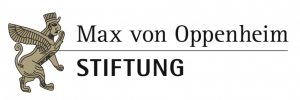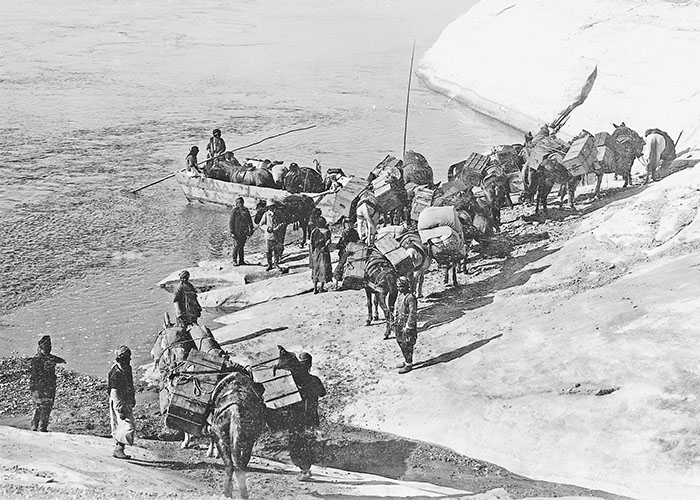1860
15 July: Max Adrian Hubert von Oppenheim is born.
1864-1866
Georg Schweinfurth explores Egypt and the eastern Sudan.
1865–1867
Gerhard Rohlfs crosses North Africa.
1869
Gustav Nachtigal traverses the Sudan and the Sahara; at the same time Georg Schweinfurth explores the region between Nile and Congo. The Suez Canal is completed.
1870
Heinrich Schliemann excavates nine levels of ancient Troy and discovers the Treasure of Priam.
1871
18 January: Following Prussia’s victory in the Franco-Prussian War, King Wilhelm I, King of Prussia, is declared Emperor of Germany in the Hall of Mirrors at Versailles.
1878
At the Congress of Berlin, the German Empire mediates in Balkan politics.
1879/80
He fulfills the obligatory military service of one year as a volunteer in the 15th Uhlan Regiment, Strasbourg.
1881
Max von Oppenheim transfers to the University of Berlin
1882
At his father’s inducement, he returns to Cologne to continue his studies of law with a tutor.
Great Britain occupies Egypt.
1883
24 February: in Cologne Oppenheim passes his first state law examination, and after the title Dr. jur. is conferred upon him by the university in Göttingen on 1 March, he immediately begins his training as a law clerk. The winter is spent travelling through Italy, Greece, and Asia Minor.
1883–1891
Max von Oppenheim’s clerkship training takes place in Bergheim near Cologne, Wiesbaden, Rüdesheim, and Oppeln. During this period, he becomes personally acquainted with the German explorers of Africa Gustav Nachtigal and Gerhard Rohlfs.
1884
Germany initiates a colonial policy. Carl Peters founds the German Colonial Society (Deutsche Kolonialgesellschaft).
1886
Max von Oppenheim travels to Morocco for the second time.
1890
Emperor Wilhelm II dismisses Imperial Chancellor Otto von Bismarck, putting an end to an epoch of German politics.
1891
6 June: Oppenheim passes the assessor examination in Cologne.
1892
In September, Oppenheim, in the company of Wilhelm Joest, undertakes his third journey to the orient, spending the winter 1892/93 in Cairo.
The initial segment of the Anatolian Railway, from Istanbul to Ankara, is completed.
1893
24 June: In Damascus, Oppenheim begins his travels from the Mediterranean to the Persian Gulf and onward to India and German East Africa, where he purchases a large stretch of land with the intention of growing coffee.
1894
Oppenheim’s plan to lead a German expedition to Lake Chad comes to naught after the chieftain of an Arab tribe conquers the region.
1894-1896
Max von Oppenheim resides primarily in Berlin where he works on his travelogue Vom Mittelmeer zum Persischen Golf (From the Mediterranean to the Persian Gulf).
1895
He travels to Constantinople where he has a private audience with Sultan Abdul Hamid II.
1896
Max von Oppenheim is made attaché at the Imperial German General Consulate in Cairo.
1897
During a journey in the Lebanon, he becomes acquainted with Emir Shekib Arslan.
War breaks out between the Ottoman Empire and Greece.
1898
Max von Oppenheim accompanies Prince Alfred von Sachsen-Coburg und Gotha on a journey to Jerusalem and Transjordan.
An Anglo-Egyptian army conclusively quells the Mahdist Revolt in the Sudan.
Emperor Wilhelm II’s voyage to the Orient awakens British fears of a potentially massive engagement of the German Empire in the world of Islam. The German Oriental Society (Deutsche Orient-Gesellschaft) is founded.
1899
Max von Oppenheim undertakes a journey exploring Syria, Upper Mesopotamia, and eastern Turkey; in its course, he discovers Tell Halaf on 19 November.
Establishment of the Vorderasiatische Abteilung (Near Eastern Department) of the Royal Museums in Berlin and the first excavations of ancient Babylon under direction of Robert Koldewey.
1902
Max von Oppenheim travels to the USA to evaluate how a transcontinental railway might affect a country’s economy and society.
1903
Beginning of construction of the Baghdad Railway, financed with German capital and intended, when complete, to run from Konya in Anatolia to Baghdad. Excavations under the direction of Walter Andrae begin at Assur.
1904
After another sojourn in the USA, Oppenheim publishes a study projecting how railway construction in Mesopotamia could result in an economic and social boom.
8 April: Great Britain and France sign a series of agreements, the “Entente Cordiale,” settling their centuries’ long rivalry over influence in North Africa.
1905
Max von Oppenheim attends the 14th International Congress of Orientalists in Algiers as a delegate of the German Empire. Afterwards, he travels through Algeria and Tunisia.
Tensions develop between Germany and France during the First Moroccan Crisis.
1908
Max von Oppenheim participates in the 15th International Congress of Orientalists in Copenhagen.
Construction begins on the Pergamon Museum in Berlin.
1910
1. November: At Oppenheim’s request, he is released from service in the Foreign Office, and receives the title Ministerresident.
1911
The dispatching of a German gunboat to Agadir results in the Second Moroccan Crisis.
1911-1912
Italo-Turkish War: The Ottoman provinces of Tripolitania and Cyrenaica become Italian colonies.
1911-1913
Oppenheim’s first campaign of excavations at Tell Halaf produces rich results.
1912-1913
War in the Balkans. The Ottoman Empire loses the Aegean Islands to Greece.
1913
Max von Oppenheim acquires a grand apartment in Berlin at Kurfürstendamm 203.
Thanks to a putsch, the “Young Turks” gain control of the Ottoman Empire which becomes embroiled in several armed conflicts in the Balkans.
1914
The Foreign Office assigns Oppenheim the task of creating and directing the Intelligence Bureau for the East (Nachrichtenstelle für den Orient/NfO). In November, he completes his Denkschrift betreffend die Revolutionierung der islamischen Gebiete unserer Feinde (Memorandum on revolutionizing the Islamic territories of our enemies).
28 June: The assassination in Sarajevo of Archduke Franz Ferdinand, designated successor to the Austrian throne, leads to the First World War.
August: The Ottoman and German Empires conclude a treaty of alliance. In November, Sultan and Caliph Mehmed V declares “Holy War” against opposing nations.
1915
Max von Oppenheim travels to Constantinople, establishing intelligence offices throughout the Ottoman Empire where propaganda material is made available.
Gallipoli Campaign, one of the bloodiest battles of the First World War, ends with a resounding defeat of the British and their allies.
Up to 1.5 million Armenians die in massacres and on death marches at the hands of the Ottoman Empire’s Young Turk regime.
1916-1918
Under the leadership of Sharif Hussein of Mecca, the Arabs revolt against the Turks. They are supported in their struggle for an independent Arab state by Great Britain (T. E. Lawrence).
1916
In the secret Sykes-Picot Agreement, Great Britain and France pledge in the event of a Turkish defeat to share the Ottoman Empire’s Arab provinces.
1917
Max von Oppenheim returns to Berlin to work on the publication of the excavation and of his research on the Bedouin.
British Troops take Baghdad.
1918
The First World War ends with the defeat of Germany and the military collapse of the Ottoman Empire.
1920
In the wake of the new division of the conquered Ottoman Empire, the League of Nations grants France the mandate over Syria and Lebanon while the mandate over Palestine, Mesopotamia, and Kurdish northern Iraq goes to Great Britain.
1922
Max von Oppenheim establishes the Institute for Oriental Research in Berlin with headquarters at Savigny Platz 6.
1923
Oppenheim continuously experiences financial difficulties, because of hyperinflation in the aftermath of the war.
The Treaty of Lausanne establishes the borders of the new Republic of Turkey. Its first premier, Mustafa Kemal Atatürk, seeks to Europeanize the nation.
1925
Max von Oppenheim serves as advisor for the precise definition of the border between Turkey and Syria.
Ibn Saud, leader of the House of Saud, conquers the Hejaz.
1927
Max von Oppenheim successfully manages to finance a special trip to Tell Halaf. An agreement about the division of finds is reached with the regime of the French Mandate.
Kemal Atatürk gives his great programmatic speech “The new Turkey”.
1929
Max von Oppenheim returns to Tell Halaf for a second season of excavation, simultaneously beginning work at Djebelet el Beda. He founds the eponymous Max von Oppenheim Foundation in Berlin.
The stock market crash in New York Stock precipitates a global financial crisis.
1930
The Tell Halaf Museum opens its doors on Oppenheim’s 70th birthday.
The Pergamon Museum is inaugurated in October.
1931
Max von Oppenheim’s financial problems prompt him to travel to the USA where he intends to sell some of his finds from Tell Halaf. But no buyers materialize, due to the economic crisis (“the Depression”).
1932
Proclamation of the Kingdom of Saudi Arabia by Ibn Saud.
1937
Max von Oppenheim spends several weeks of “rest and recuperation” in Palermo, Sicily.
1939
He travels to Syria for the last time, but is prevented by the government of the French Mandate from going to Tell Halaf and resuming excavations.
Germany’s invasion of Poland marks the beginning of the Second World War.
1943
August: The Foundation’s apartment on Savigny Platz is heavily damaged by bombing and rendered uninhabitable. Oppenheim moves to Dresden. In November, a phosphorus bomb destroys the Tell Halaf Museum.
The German defeat at the Battle of Stalingrad decisively turns the tide of the Second World War.
1945
After the bombing raid on Dresden in February, Oppenheim goes to live with his sister Wanda von Pocci at Schloss Ammerland, on Starnberger See.
On 9 May, the German capitulation comes into force.
1946
Spring. The 86-year old Orientalist moves to Landshut where he passes away on 15 November.

